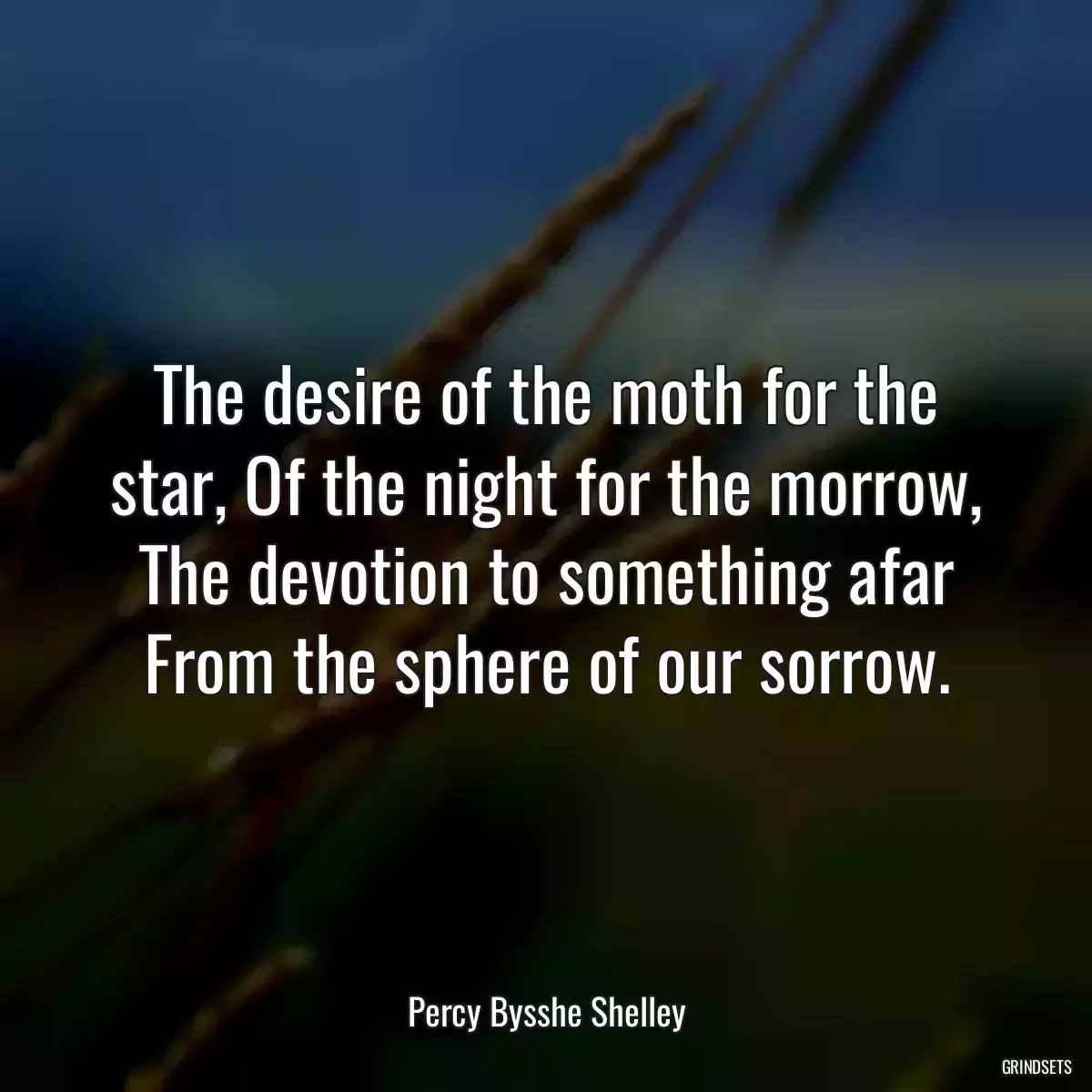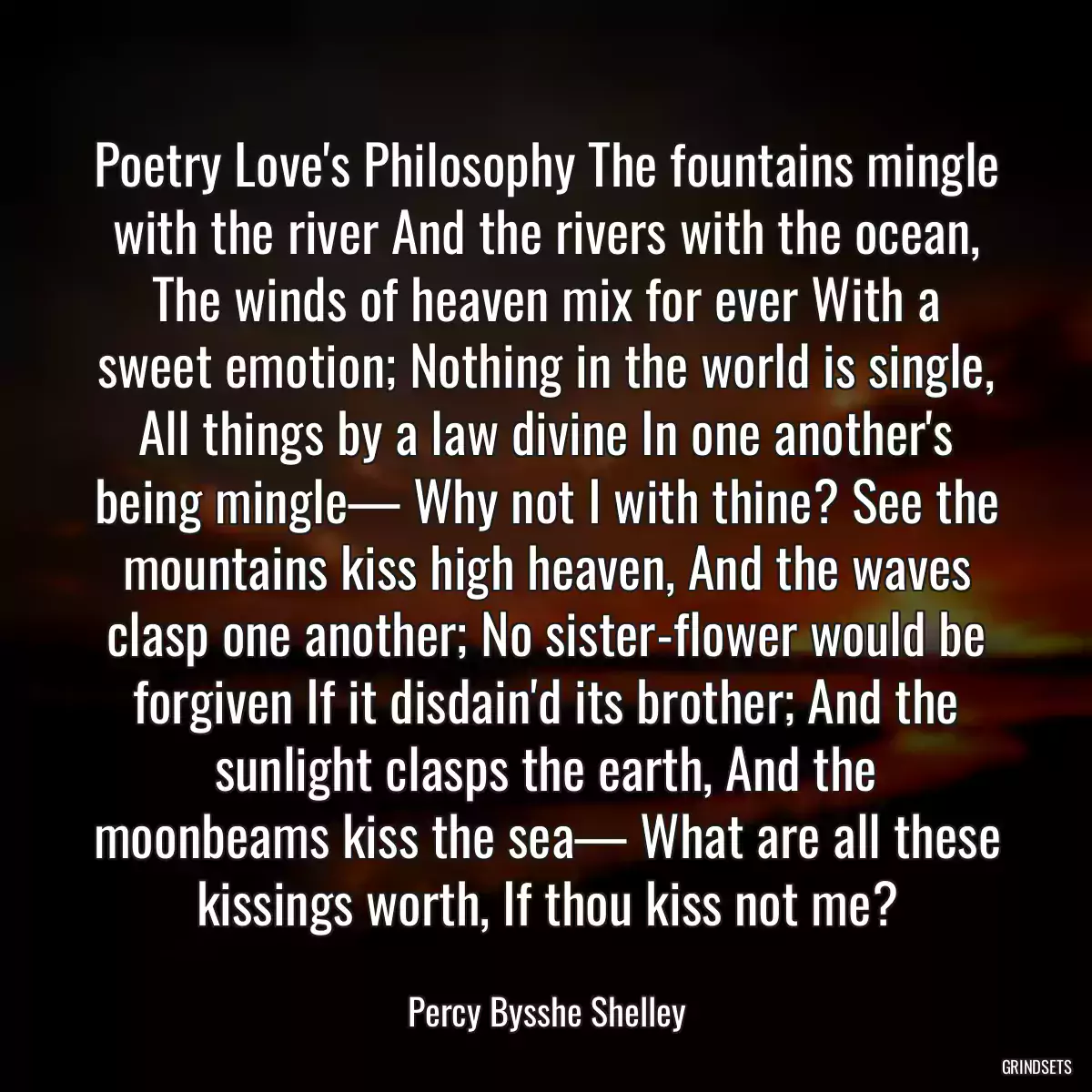
Quotes Percy Bysshe Shelley
Find dozens of Percy Bysshe Shelley with images to copy and share.

I am the daughter of Earth and Water, And the nursling of the Sky; I pass through the pores of the ocean and shores; I change, but I cannot die. For after the rain when with never a stain The pavilion of Heaven is bare, And the winds and sunbeams with their convex gleams Build up the blue dome of air, I silently laugh at my own cenotaph, And out of the caverns of rain, Like a child from the womb, like a ghost from the tomb, I arise and unbuild it again.
But hope will make thee young, for Hope and Youth
Are children of one mother, even Love.
In the firm expectation that when London shall be a habitation of bitterns, when St. Paul and Westminster Abbey shall stand shapeless and nameless ruins in the midst of an unpeopled marsh, when the piers of Waterloo Bridge shall become the nuclei of islets of reeds and osiers, and cast the jagged shadows of their broken arches on the solitary stream, some Transatlantic commentator will be weighing in the scales of some new and now unimagined system of criticism the respective merits of the Bells and the Fudges and their historians.
You may also like
Gentleness, Virtue, Wisdom, and Endurance, These are the seals of that most firm assurance Which bars the pit over Destruction's strength; And if, with infirm hand, Eternity, Mother of many acts and hours, should free The serpent that would clasp her with his length; These are the spells by which to reassume An empire o'er the disentangled doom.
I bring fresh showers for the thirsting flowers, From the seas and the streams; I bear light shade for the leaves when laid In their noonday dreams. From my wings are shaken the dews that waken The sweet buds every one, When rocked to rest on their mother's breast, As she dances about the sun. I wield the flail of the lashing hail, And whiten the green plains under, And then again I dissolve it in rain, And laugh as I pass in thunder.
Necessity, thou mother of the world!
I was an infant when my mother went To see an atheist burned. She took me there. The dark-robed priests were met around the pile; The multitude was gazing silently; And as the culprit passed with dauntless mien, Tempered disdain in his unaltering eye, Mixed with a quiet smile, shone calmly forth; The thirsty fire crept round his manly limbs; His resolute eyes were scorched to blindness soon; His death-pang rent my heart! the insensate mob Uttered a cry of triumph, and I wept. Weep not, child! cried my mother, for that man Has said, 'There is no God.'
In proportion to the love existing among men, so will be the community of property and power. Among true and real friends, all is common; and, were ignorance and envy and superstition banished from the world, all mankind would be friends. The only perfect and genuine republic is that which comprehends every living being. Those distinctions which have been artificially set up, of nations, societies, families, and religions, are only general names, expressing the abhorrence and contempt with which men blindly consider their fellowmen.

One word is too often profaned For me to profane it, One feeling too falsely disdain'd For thee to disdain it. One hope too like dispair For prudence to smother, I can give not what men call love: But wilt thou accept not The worship the heart lifts above And heaven rejects not: The desire of the moth for the star, The devotion of something afar From the sphere of our sorrow?
It is thus that the generality of mankind, whose lot is ignorance, attributes to the Divinity, not only the unusual effects which strike them, but moreover the most simple events, of which the causes are the most simple to understand by whomever is able to study them. In a word, man has always respected unknown causes, surprising effects that his ignorance kept him from unraveling. It was on this debris of nature that man raised the imaginary colossus of the Divinity.
The most refined abstractions of logic conduct to a view of life, which, though startling to the apprehension, is, in fact, that which the habitual sense of its repeated combinations has extinguished in us. It strips, as it were, the painted curtain from this scene of things. I confess that I am one of those who are unable to refuse my assent to the conclusions of those philosophers who assert that nothing exists but as it is perceived.
Love is free; to promise for ever to love the same woman is not less absurd than to promise to believe the same creed; such a vow in both cases excludes us from all inquiry.
Had this author [Sir W Drummond Academical Questions, chap. iii.], instead of inveighing against the guilt and absurdity of atheism, demonstrated its falsehood, his conduct would have, been more suited to the modesty of the skeptic and the toleration of the philosopher.
All things are sold: the very light of heaven is venal; earth's unsparing gifts of love, the smallest and most despicable things that lurk in the abysses of the deep, all objects of our life, even life itself, and the poor pittance which the laws allow of liberty, the fellowship of man, those duties which his heart of human love should urge him to perform instinctively, are bought and sold as in a public mart of not disguising selfishness, that sets on each its price, the stamp-mark of her reign.
February... Bending from Heaven, in azure mirth, It kissed the forehead of the Earth, And smiled upon the silent sea, And bade the frozen streams be free, And waked to music all their fountains, And breathed upon the frozen mountains.
See the mountains kiss high Heaven And the waves clasp one another; No sister-flower would be forgiven If it disdained its brother; And the sunlight clasps the earth, And the moonbeams kiss the sea - What is all this sweet work worth If thou kiss not me?
You may also like

Poetry Love's Philosophy The fountains mingle with the river And the rivers with the ocean, The winds of heaven mix for ever With a sweet emotion; Nothing in the world is single, All things by a law divine In one another's being mingle— Why not I with thine? See the mountains kiss high heaven, And the waves clasp one another; No sister-flower would be forgiven If it disdain'd its brother; And the sunlight clasps the earth, And the moonbeams kiss the sea— What are all these kissings worth, If thou kiss not me?
Thou hast a voice, great Mountain, to repeal. Large codes of fraud and woe; not understood by all, but which the wise, and great, and good interpret, or make felt, or deeply feel.